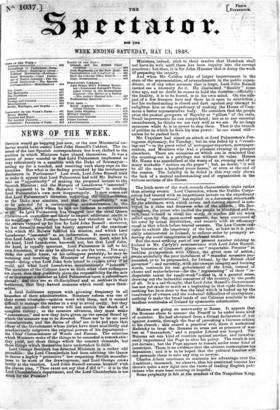The Irish news of the week records characteristic traits rather
than stirring events. Lord Clarendon, whom the Dublin Corpo- ration had treated with an impertinent lecture on the expediency of being "constitutional," has replied in a documesit remarkable for ,the adroitness with which severe and cutting reproof is con- veyed in a calm and decorous echo of the addreas. Mr. Ber- miediam, the priest who incited the people to bloodshed and re- Ifolf,71-and 1-fused to recall his worsts or confess shit) sin when called upon by the most sacred appeals, has beeti convinced id his error by actual deprivation, and recants with an effrontery equal to that which before braved censure. The Law Courts con- tinue to exhibit the impotency of the law, at least as it is judi- cially administered in Ireland, to enforce order by promptly ar- resting the overt conspiracies of professed traitors. But the most striking part of our present number relating to Ireland is Mr. Carlyle's remonstrance with Lord John Russel]. The historian of Cromwell places our "respectable Premier" in luckless juxtaposition with Oliver, the great man of action ; treats scornfully the poor instalment of "remedial measures pro- pounded, or to be propounded, for Ireland, by the British chief governor "; and earnestly, with picturesque imagery and burning words, contends for real government of the Irish, instead of shams and make-believes—for the "regimenting" of their "in- disputable talent for spade-work"—that is, in a general sense, drawing out the industrial resources of the country, to the profit of all. It is a sad thought, that Lord John Russell's Government has not yet made so much as a beginning in that right direction: nothing has been done to free the land which is locked up by the insolvency of owners and the technical difficulties of conveyance; nothing to make the broad lands of our Colonies available to the landless multitudes of Ireland by systematic colonization.


























